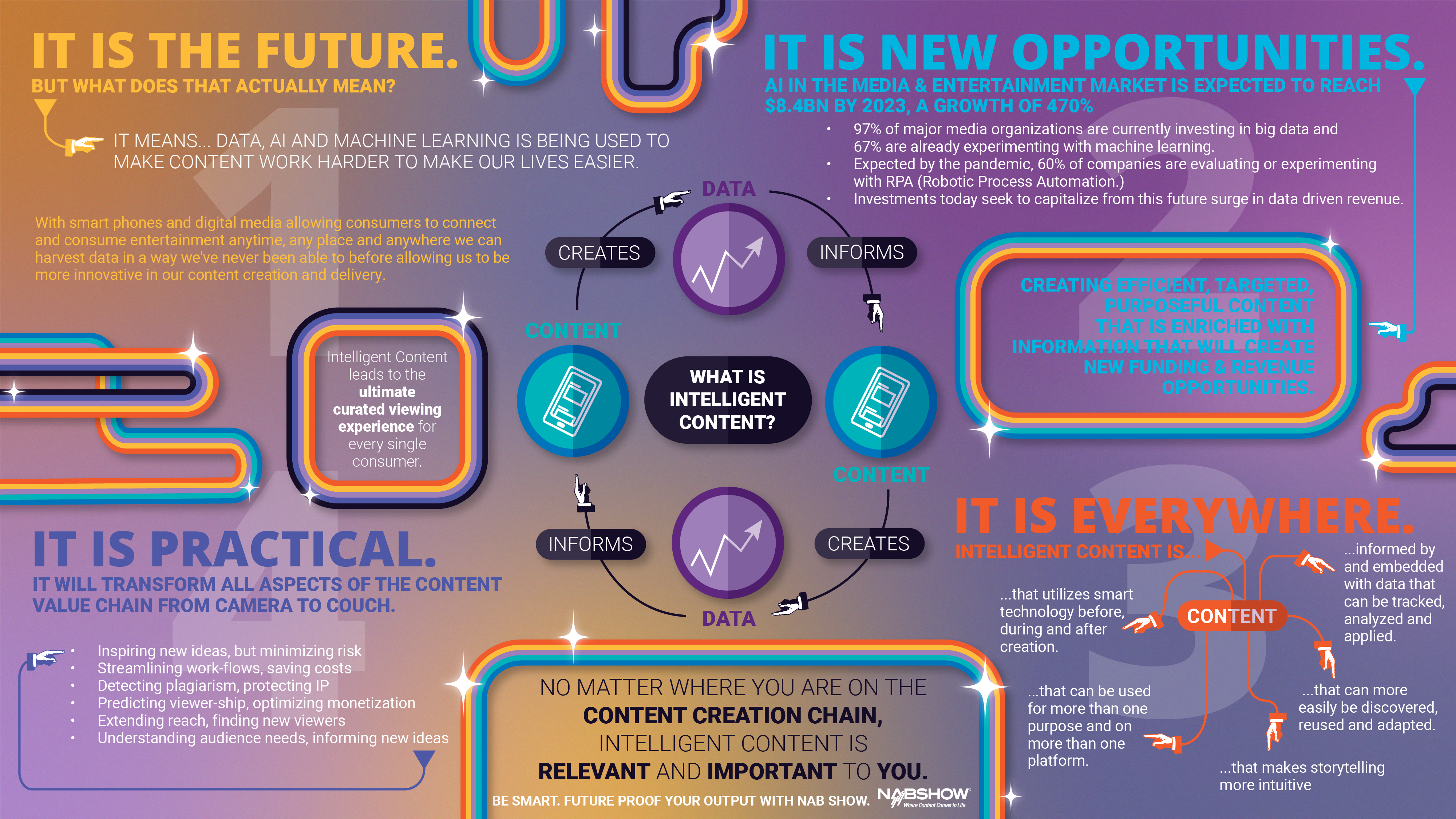We’ve spent the last few months doing a deep dive into intelligent content. Trying to work out what it actually means…

And how it can help us as creative entities or as content creators. We’ve also explored how to connect to audiences and how to make money using IC.
How Will Intelligent Content Shape M&E’s Future?
Now we’re going to look into what it actually means for the future of the media and entertainment industry. What are the questions we need to be asking? And what can we do to ensure it has a positive impact as opposed to the “murderous machines intent on wiping out the human race” notion that Hollywood has been scaring us with for decades?
Here’s an overview of the issues we should be thinking about as we head boldly into this new technological frontier.
Although we have been using the elements that make up intelligent content for a while, we have an opportunity to take a step back and check in on our responsibilities before we let things get out of our control, especially as we are living in a time with the global ticking clock that is Climate Change. This is not the first time in history where technological advances have changed the media landscape beyond all recognition, and in turn changed society. Here’s a link to an in-depth look at these advances and their impact, from the telegraph to the internet.
And here’s a look at what the next decade of advances might mean for the media and entertainment industry.
With all these past seismic events and their consequent fallouts lived through, well documented and analyzed, we can and should learn how to make the best out of these current advances, keep the industry in check, increase culpability and make sure we are working in an ethical landscape. And, most importantly, ensure we don’t sleep-walk into consequences that could spiral out of our control. Hindsight is a wonderful thing.
Let’s see how, in theory, we have time to keep things ethically in check before we fully launch new technology and dive into Web3.
Why not go down this responsibility-themed rabbit-hole for some more things to think about?
An interesting video overview of AI ethics.
- Consider IBM’s multidisciplinary, multidimensional approach to trustworthy AI.
- Here’s a take on the good versus evil arguments for and against artificial intelligence.
- Cognizant offers this overview of data ethics.
- Or check out the data ethics canvas and learn how to use it.
- But maybe we can use NFTs to save the world?
- Keep in mind the bigger picture when it comes to selling photographs as NFTs.
- And the good people of Quora discuss what AI is going to mean for the media and entertainment industry.
- What is AI worth for M&E?
AI and ML Can Help — Or Hurt — Diversity Initiatives
One thing that we should be looking to solve in the industry is the lack of diversity and intelligent content can help us to improve inclusivity and open up the playing field in a way that we previously have struggled to do so.
We need to strive to move AI away from ethnic bias, in facial recognition technology, in NPC creation in video games, in finding candidates for jobs and much more. New technologies, particularly in the field of remote production can open up the field and find practitioners from global areas traditionally underrepresented in the media industry. And it can help to make personalized content that appeals to and represents wider, more diverse audiences.
Dive into this diversity-focused rabbit hole for more thoughts on this subject…
- MESA talks about improving diversity in the media, amongst other things.
- So, who is making sure the algorithms — and machines learning from them — aren’t racist?
- Learn about Twitter’s problematic image cropping system.
- On the other hand, AI models could help increase diverse media representation.
- Here’s an interesting article on using games and AI to improve diversity, equity, inclusion and belonging in the workplace.
- What role does diversity and inclusion play in the development of AI?
- Is all artificial intelligence inherently biased?
- For a really deep dive, read this AI Now study.
Safety Awareness in the Intelligent Content Age
Safety is key. We can use intelligent content to make our media landscape a safer place in multiple different ways.
It can help protect ownership, prevent theft and solve IP and copyright debates. It can give content creators a sense of security. It can give people autonomy over their own data. It can help deliver the right content to the right audience and monitor age appropriateness, keeping young viewers from seeing or interacting with content that might harm them. It can keep talent safe by using deep fake and CGI technology whilst also maintaining transparency and accuracy in information – protecting us from fake news and data corruption. And it can make sure cybersecurity is a priority as we move forward into the brave new world of the metaverse and Web3.
We all know that data can be misused to manipulate social media users and ultimately change the political landscape. We saw that with Cambridge Analytica, Facebook and both the Trump campaign in the U.S. and the Brexit ‘Vote Leave’ campaign in the UK.
- Here’s a simple diagram illustrating the Cambridge Analytica scandal.
- And here’s what happened with the Vote Leave campaign.
- For a more entertaining look at how dubious data-use caused Brexit, here’s Benedict Cumberbatch as Dominic Cummings, the mind behind the campaign.
Keep yourself — and the industry — secure with this safety-focused rabbit hole…
- Consider these five principles of data ethics.
- Could turning unsolicited intimate photos into NFTs be a way of turning abuse into assets?
- What do we know about how the patent system handles robot inventors?
- A breakdown of everything you need to know about deep fakes.
- Are deep fakes signs of dystopian future for the media industry?
- An AI answers some of the most pressing in-game ethical dilemmas.
- A fascinating review of a fascinating book about disinformation and deep fakes.
- How AI can help prevent the spread of fake news.
- Here’s a simple game that shows how fake news can be spread on social media.
- How AI and machine learning are improving cybersecurity.
- How the metaverse could shape cybersecurity.
We Need to Examine Intelligent Content’s Implications, Carefully and Closely
All of this should lead us to realize that new technologies and intelligent content must be subjected to some serious scrutiny if we’re going to make the media landscape a safe and ethical place that takes its responsibilities seriously.
These are exciting times for media and entertainment and we all want to do our best to create a better future. Intelligent content can help us to do this by using data to make more informed decisions about what we produce. Allowing production to become smarter and more streamlined. Creating new platforms and ways of reaching audiences. Using clever technology like blockchain to help with monetization. And most importantly, gaining the trust of our viewers.
Why not pop down this scrutiny rabbit hole to see how we do this…
- The future of media and entertainment.
- Security, privacy and ethics in the Web3 era.
- Reinventing philanthropy on the blockchain.
- A call for game designers to reduce regret by making more ethical choices.
- Is synthetic media the next phase of content creation?
- What is the endgame for AI?
- The devil is in the machine – how do we make AI responsible?
Is Intelligent Content on Our Side (Or Its Own)?
We are undeniably in the middle of a technological revolution, and we have the power to make sure it’s working for us and not against us.
Previous revolutions seemed to come out of nowhere. The internet quickly grew from a few clunky, slow-to-load sites to the beast that it is now that took over our lives in the blink of an eye. Its power and influence, for both good and evil, is clear.
And we now have a generation growing up that have never not had access to the web and who would struggle to exist without social media.
Who would have thought that the growth of one simple app idea would be fascinating enough to be turned into a hugely successful movie (and internet empire)? Watch this excellent trailer for The Social Network (2010) and try not to get chills.
Streaming was another extraordinary innovation that snuck up on us. From DVD-by-mail services (Netflix’s origin story, if you recall) and video rental stores (RIP, Blockbuster) to multiple powerhouse services run by the biggest companies in the world. This is how it happened.
Go back in time and read about competition in DVD-by-mail. Nobody saw Netflix coming in the early ’00s.
With intelligent content, we can take charge of the next phase in storytelling and content consumption. The future doesn’t have to be a scary place and we can still prevent Skynet from happening.
Watch the T-800 (Arnold Schwarzenegger) explain how Skynet takes over the world, in this clip from Terminator 2: Judgment Day.
There’s no doubt content creators are still going to obsess about ‟the singularity.” Per Wikipedia, the technological singularity is the hypothetical point in time at which technological growth becomes uncontrollable and irreversible, resulting in unforeseeable changes to human civilization.
After all, it does make for compelling viewing. (Here’s a list of 10 essential movies about AI.)
But as long as we stay aware, put robust systems in place, keep our own ethical and moral responsibilities in check and keep John Connor alive, humanity should be safe… for now.
Hop down this cool things rabbit hole and join the conversation:
- Here’s a guide to staying employed during the robot takeover.
- Learn how the AI Now Institute is making sure new technology is accountable.
- With great power comes great responsibility. Watch a six-minute video explaining the ethics of data science.
- Is it ethical to deep fake voices of dead celebrities, with or without the permission of the deceased or their loved ones? A documentary about Anthony Bourdain stoked this controversy.
- Dig into the ethics of the Tom Cruise deep fake.
- Is AI the best or worst thing to happen to humanity? Listen to the late Stephen Hawking’s thoughts.
- A movement towards a better, fairer internet.
- Create the face of someone who does not exist with AI.
- Get the lowdown with this series of Ted Talks about AI and digital disruption.
- Could you fall in love with Siri? How Spike Jonze saw the future of virtual personal assistants in the 2013 film Her.
- And lastly, SNL writers don’t think we need to worry about robots doing comedy any time soon.

